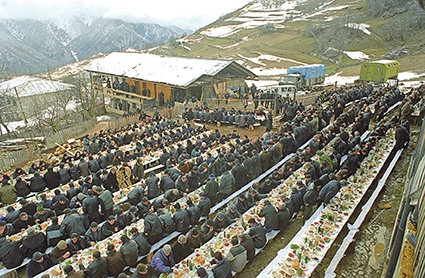Supra-califragilist…etc
BLOG
No, NOT a tribute to the new Mary Poppins soon to grace our movie screens. SUPRA-, not SUPER. Supra, as in the Georgian feast. About which one could write so much, it would fill books. Some have: I own a trilingual volume about the supra’s rules and traditions, which I consider vital knowledge in this country. I can’t speak for the quality of the Russian part, though it seems pretty good; the English section is deplorably bad for such essential reading; and the native Georgian original is likely flawless. Someone needs to offer to edit and proofread that English, though, to make it more accessible!
I was at yet another supra yesterday, about fifteen minutes’ walk above our house in Etseri, Svaneti. The massive dump of snow from two days ago was melting frantically and flooding down the road, all efforts to divert it with pick and shovel were swamped by 4x4 tires as a host of cars drove up to the home of the bereaved family. At least, after consulting the weather reports, they’d got their day right: today was cloudless sun, thus the new rivers. Somehow the shoes I chose instead of black rubber boots stayed dry as I hopped from island to island.
Now, a supra in a village such as this is very different from a private one in someone’s house or in a city banquet hall. Bench and table supports must be made from scratch, from local wood, to hold the ready rented planks which go from event to event. Boxes of crockery and, if you’re lucky, cutlery, also go the rounds where needed. If weather is SUSpicious as opposed to AUspicious, and the family can afford it, a marquee can go up. But all the construction work for a group of one to several hundreds of guests is done by the men, so there’s a much more even distribution of labor between the sexes here.
The furniture legs are pointed and hammered into the ground, not just sitting on it; planks nailed to them, for firmness. The men may also (if you’re not in Lent’s Great Fast season, which we were yesterday) make one or more large fires and stew or roast meat dishes in massive cauldrons or on long stakes. They’re not just sitting around being served by the women! And the women, too, will have their own supra, usually separate from the men. Serving is done by both, with the men handling the distribution of wine and moonshine as the drinking gets serious. And, of course, the tamada, the toastmaster, will be a man, unless there’s some very unusual reason for a woman to take this role, rare enough that I’ve never seen it in a village setting.
This feast had no marquee; the brilliant sunshine was actually quite warm and the risk paid off. (If you get this wrong it can simply be described as a disaster, one more piece of bitterness to add to the loss of a loved one.) No utensils either. This was more problematic, as it means putting food on your plate with one or two pieces of bread, and eating it with them too. No matter how dry or wet the dish, this is how it’s done in this case. I find I can’t eat nearly as much this way, though I am learning the etiquette of it so as not to miss out. And also reminding myself in the process that there are many more ways to eat in a civilized manner than my stiff British upbringing would allow: When in Rome.
The deceased was quite an old man; nonetheless, his death had likely been hastened by the shock and stress of losing his son to senseless drunk driving a few years earlier (mercifully, he had taken no one with him to the grave). The supra began at about three in the afternoon and people began leaving only an hour and a half later, with farm chores to attend to and a sunset not more than two hours off, bringing back the real chill of winter. So it was what I would call it mercifully short.
The cleanup afterwards, too, would be a mixed affair, with the men taking down the furniture on the day or the next while the women handled the dishwashing and packing up of the obligatory vast amounts of leftovers. All in all, gender-wise a much more democratic event, which is really my point.
Tony Hanmer has lived in Georgia since 1999, in Svaneti since 2007, and been a weekly writer for GT since early 2011. He runs the “Svaneti Renaissance” Facebook group, now with over 1800 members, at www.facebook.com/groups/SvanetiRenaissance/
He and his wife also run their own guest house in Etseri:
www.facebook.com/hanmer.house.svaneti
Tony Hanmer












